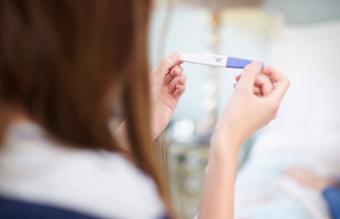
Estimating your baby's due date by conception date isn't as easy as it sounds because the exact day of conception isn't usually known. Other factors can influence your due date as well, and if you're wondering how long it is from conception until birth to help you figure out your due date, it can be a little tricky.
Due Date by Conception Date: A Tricky Calculation
It sounds simple. If you know when you had intercourse, you should be able to calculate your exact due date. However, there's a little more to it than that. The reason it's so difficult to calculate your due date by conception date is because in many cases the actual conception date isn't known. Most women don't keep track of the days they have intercourse unless they are actively trying to become pregnant. Even in the cases where they do, it still may not tell them precisely when they conceived.
When the Egg and Sperm Meet Is Unknown
The actual date when egg and sperm meet is unknown because two things occur at different times. The first is when ovulation occurs and the second is when the sperm reaches the egg. Sperm can live up to five days after you've had intercourse. If you have not ovulated yet, the sperm has to wait until there is an egg to fertilize. If you do not ovulate in time, the sperm dies. Even though you may know which night(s) you had intercourse, you still may not have actually conceived until five days later. Therefore, the exact day when the sperm and the egg finally meet is difficult to determine and you have no way of actually knowing when it happens.
Why Five Days Matters
Still, you probably think this should only make a difference of five days or so in your calculations. What's five days in a 40 week pregnancy? However, not all babies are born at 40 weeks gestation which may throw off your calculations. Babies can be a bit unpredictable about when they decide to arrive and can be delivered at 37 weeks gestation which is considered full-term.
More Accurate Calculations
So, calculating your due date by conception date isn't very accurate. How can you get more accurate calculations? First, you are very unlikely to be able to calculate your exact due date, although it happens occasionally. Second, if you want a reasonably accurate calculation you need to be aware of the following facts.
Due Date Based on 28-Day Menstrual Cycle
Menstrual cycles vary from woman to woman. They can range from as few as 22 days to as many as 44 days. You need to know how long your average cycle is. If your cycle averages 28 days, you may find an online pregnancy calculator to be fairly accurate. If you add 280 days to the first day of your last period you will get the same result as the pregnancy calculator based on that 28 day average. This calculation is based on the 40 week rule mentioned above. Try using a due date calculator, which uses the first day of your last menstrual cycle to estimate when your baby will arrive.
Due Date Based on Ovulation Period
Another helpful fact is to know when you ovulate. There are a number of ovulation predictors on the market. You can also track your basal body temperature which will give you a fairly good idea of when you will ovulate. This may even give you a more precise calculation than the 40 week rule. Once you know your date of ovulation, add 266 days. This will help with the accuracy of figuring out your due date because you know when you actually ovulated as opposed to approximating ovulation and hoping the timing is right.
Other Variables
There are a few other variables that can influence a baby's due date. The mother's age, her health, and even her race can all play a role in when her baby is born. If you are a first time mom, you may carry your baby longer than a woman who is having her sixth child or if you are carrying multiples, you are more likely to give birth sooner than a woman who is carrying one baby. Keep in mind, every woman and every pregnancy is different and sometimes it's hard to predict when you will actually deliver your baby.
From Conception to Birth Time
There are other, more accurate methods of determining when a baby is due as well. Instead of calculating your due date by conception date, your health care provider will likely order an ultrasound to determine your due date. The earlier you have your ultrasound, the more accurate it is. Not only is ultrasound an excellent way to determine your due date, it is also very safe. Your health care provider wants you and your baby to be healthy and happy. If you have any questions or concerns, don't hesitate to ask.







